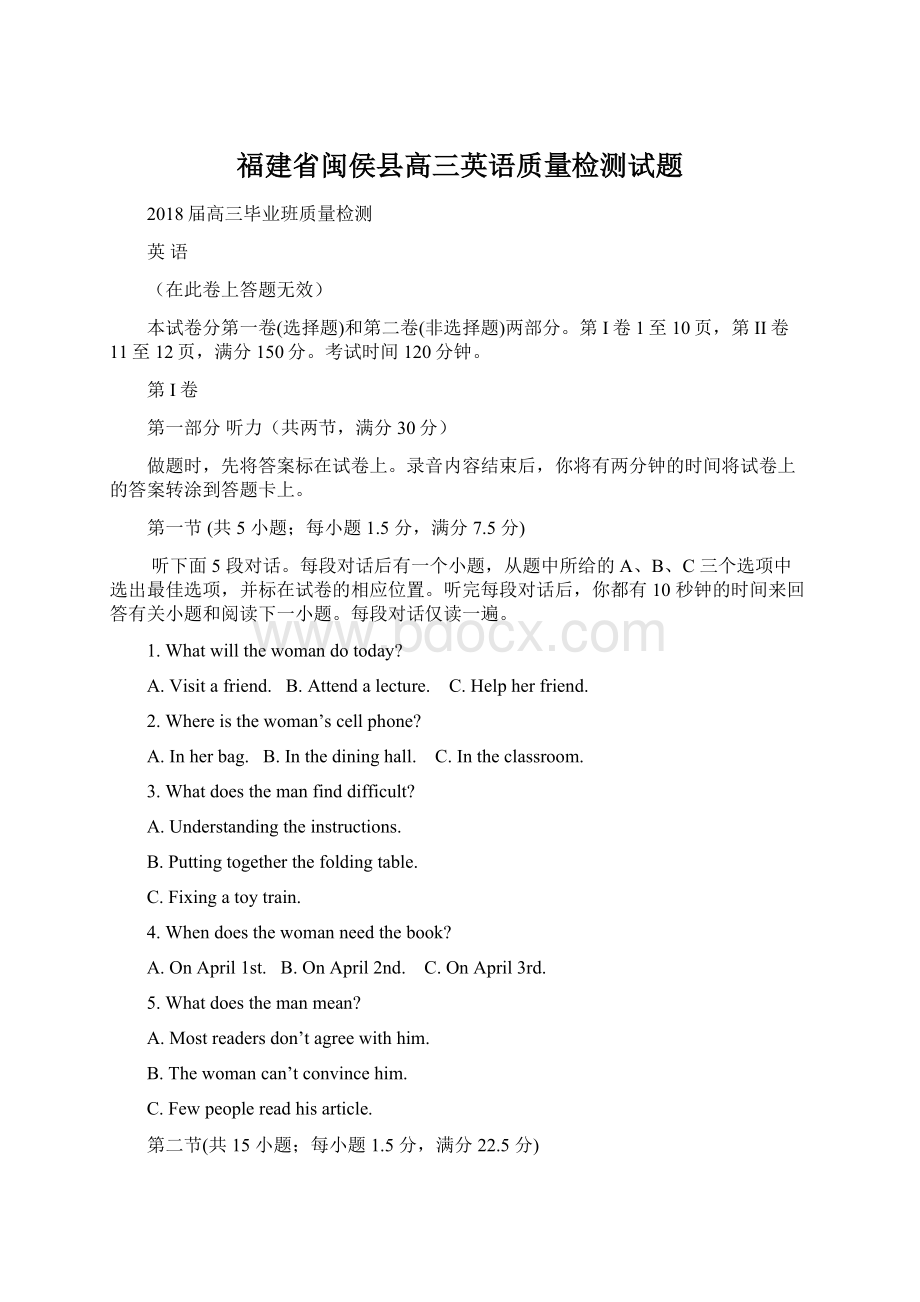福建省闽侯县高三英语质量检测试题Word文件下载.docx
《福建省闽侯县高三英语质量检测试题Word文件下载.docx》由会员分享,可在线阅读,更多相关《福建省闽侯县高三英语质量检测试题Word文件下载.docx(19页珍藏版)》请在冰豆网上搜索。

听完每段对话后,你都有10秒钟的时间来回答有关小题和阅读下一小题。
每段对话仅读一遍。
1.Whatwillthewomandotoday?
A.Visitafriend.B.Attendalecture.C.Helpherfriend.
2.Whereisthewoman’scellphone?
A.Inherbag.B.Inthedininghall.C.Intheclassroom.
3.Whatdoesthemanfinddifficult?
A.Understandingtheinstructions.
B.Puttingtogetherthefoldingtable.
C.Fixingatoytrain.
4.Whendoesthewomanneedthebook?
A.OnApril1st.B.OnApril2nd.C.OnApril3rd.
5.Whatdoesthemanmean?
A.Mostreadersdon’tagreewithhim.
B.Thewomancan’tconvincehim.
C.Fewpeoplereadhisarticle.
第二节(共15小题;
每小题1.5分,满分22.5分)
听下面5段对话或独白。
每段对话或独白后有几个小题,从题中所给的A、B、C三个选项中选出最佳选项,并标在试卷的相应位置。
听每段对话或独白前,你将有时间阅读各个小题,每小题5秒钟;
听完后,各小题将给出5秒钟的作答时间。
每段对话或独白读两遍。
听第6段材料,回答第6、7题。
6.Wheredidthewomanstayatnightduringtheholiday?
A.Inatent.B.Inahotel.C.Inafarmhouse.
7.Whatdoesthewomanthinkofthepeoplethere?
A.Theywereinteresting.B.Theywerefriendly.C.Theywerehonest.
听第7段材料,回答第8、9题。
8.Whatarethespeakersmainlytalkingabout?
A.Pocketmoney.B.Part-timejobs.C.Theman’sparents.
9.Howlongdoesthemantakecareofhisneighbor’sbabyeveryFriday?
A.Fortwohours.B.Forthreehours.C.Forfourhours.
听第8段材料,回答第10至12题。
10.WhatrelationisCindytoEdward?
A.Hisformerprimaryschoolmate.
B.Hisgroupmember.
C.Histeacher.
11.WhatcanEdwarddointhetheatergroup?
A.Meetfamousartists.B.Performplaysandmusicals.C.Seefilms.
12.Wherearethespeakers?
A.Atschool.B.Inaplaytheater.C.Outsideacinema.
听第9段材料,回答第13至16题。
13.Whendoesthewomangototherestaurant?
A.Intheearlymorning.B.Inthemiddleofthemorning.C.Atnoon.
14.Whatdoesthewomanlikemostabouttherestaurant?
A.Thequietenvironment.B.Thedeliciousfood.C.Thejazzmusic.
15.Whatdoesthemansayabouthisfavoriterestaurant?
A.It’snewlyopenedandclean.
B.Hethinkshighlyofthefood.
C.Afilmactoreatstheresometimes.
16.Whatdoesthemanhaveforlunch?
A.Pancakes.B.Fishpie.C.Sausages.
听第10段材料,回答第17至20题。
17.Whatis“WhattoDoToday”?
A.Aradioprogram.B.Asocialorganization.C.Aschoolteam.
18.What’sthemainpurposeofthetree-plantingactivity?
A.Tohelppoorblindchildren.
B.Togaintree-plantingexperience.
C.Toraisemoneyforacomputercompany.
19.Howmanytreesdostudentsandtheirparentswantt
oplanttoday?
A.30.B.750.C.1,500.
20.Whatshouldvolunteersbringfortheactivity?
A.Hats.B.Thickgloves.C.Basictools.
第二部分阅读理解(共两节,满分40分)
第一节(共15小题;
每小题2分,满分30分)
阅读下列短文,从每题所给的A、B、C和D四个选项中,选出最佳选项,并在答题卡上将该项涂黑。
A
Naturehasitscreationsofwildlife,humankindandplants.Onesuchbeautifulcreationisthekinginthesea—thewhale.Doyouknowwhenandwheretoseethewhales?
TheMaldives
Besttimetovisit:
OctobertoNovemberorFebruarytoApril.
Thisdestinationwithwonderfulbeautyandaratherquietatmospherehassomeofthemostunusualspeciesofwhalestooffer.Locatedinthetropical(热带的)sea,itisaveryisolatedplaceasitissaidthatonecangoonasailingfordaysandsheorhemightnotcomeacrossanothersoulduringthevoyage.
Iceland
MaytoSeptember.
Nowthisdestinationisgreatinitsownway,offeringpleasantsightsofwhalesunderthelightofthemidnightsun,rightbelowtheearth’sArcticCircle.Icelandhasanumberofspeciesofwhales,includinghumpbackwhales(座头鲸)andthebluewhales.
Alaska
August.
Alaskaismainlyfamousforhavingavarietyoffeedinghumpbackwhales—whichareknowntobeoneoftheworld’slargestandmostfascinatingspecies.Thebestpartaboutthiswhalewatchingsiteisthatonecanactuallyseegroupsofwhalesflyingintheairfromtimetotime,formingaroundshapewiththeirgroups.
AntarcticPeninsula(南极半岛)
JanuarytoFebruary.
Ifoneisanadmirerofnature,wantingtoseegroupsofnature’screationstogetherwiththeice—thisisthebestplaceforhimorher.Withavarietyofwhalesgatheringontopoftheiceinthepeninsula,thisdestinatio
nisworthallthetimeandresourcesinvested.
21.TheMaldivesisuniquebecausethereyoucan________.
A.seeanumberofbluewhalesB.enjoythemostbeautifulscenery
C.experienceanisolatedfeelingD.meetsomerarespeciesofwhales
22.WhatisspecialinAntarcticPeninsula?
A.largeareasoficeB.diversewhales
C.beautifulsceneryD.animalsplayingwithice
23.Youcanmostprobablyreadthetextin_______.
A.anewspaperB.atextbook
C.atravelguideD.atelephonebook
B
“Everybodyisagenius.Butifyoujudgeafishbyitsabilitytoclimbatree,itwillliveitswholelifebelievingthatitisstupid.”
-----AlbertEinstein
Ifyouhaveakidwithspecialneedsintheschoolsystem,chancesareyouhavecomeacrossthatsayinghangingonaclassroomwall.Myfive-year-olddaughterSyonahascerebralpalsy(脑瘫)anditmeans,combinedwithhercommunicationchallengesandsightproblems,thatstandardassessments(andby“standard”,Imeantheonesusedtoassesskidswithspecialneeds)aren’talwaysanaccuratemeasureofherabilities.
Bynowyouhaveprobablyhea
rdaboutChrisUlmer,the26-year-oldteacherinJacksonville,Florida,whostartshisspecialeducationclassbycallingupeachstudentindividuallytogivethemmuchadmirationandahigh-five.Icouldn’thelpbutberemindedofSyona’steacherandhowshesupportseachkidinaverysimilarway.Ulmerrecentlysharedavideoofhisteachingexperience.“Ihaveseentheirconfidenceandself-worthincreaserapidly,”hesaid.AllIcouldthinkwas:
Howluckythesestudentsaretohavesuchinspirationalteachers.
Syona’steacherhasanattitudethatcanbestbesummarizedinoneword:
awesome.Herteacherdoesn’tfocusonwhatcan’tbedone—shefocusesonwhatcanbedone.Overthepastseveralmonths,myhusbandDilipandIhaveseenSyona’sconfidenceincreasetenfold.Sheuseswordsshewouldn’thavethoughtofusingbefore.Sherecentlytoldmeaboutherclassmate’striptoEcuadorandwasveryproudwhenIunderstoodheronthefirsttry.
IactuallywonderwhattheinfluencewouldbeifwedidsomethingsimilartowhatUlmerdoeswithhisstudentsinourhome.We’verecentlystartedourdaybyremindingeachotherofthegoodqualitiesweallpossess.Ifweareremindedofourstrengthsonaregularbasis,wewillbecomeincreasinglyconfidentaboutprogressandsuccess.
Ulmer’sreachasateachergoesfarbeyondthewallsofhisclassroom.Infact,heteachesallofustotakeamomentandtrulyappreciatethestrengthsofanimportantpersoninourlives.
24.Whatdoestheunderlined“it”inLine5referto?
A.ThecerebralpalsywithSyona.B.Thesayingonaclassroomwall.
C.Thestandardforkidswithspecialneeds.D.TheaccuratemeasureofSyona’sabilities.
25.WhatcanwelearnaboutChrisUlmer?
A.HeisSyona’sfavoriteteacher.
B.Hehelpsincreasehisstudents’confidence.
C.Heusesvideostoteachhisstudents.
D.Heaskshisstudentstohelpeachother.
26.WhydidSyonafeelverypleasedinthethirdparagraph?
A.Shehasdevelopedapositiveattitude.
B.Hermotherknewwhatsheexpressed.
C.Herprogresswasappreciatedbyherparents.
D.ShehadbeentoEcuadorwithherclassmate.
27.Whatchangehastakenplaceintheauthor’sfamily?
A.TheyinviteUlmer’sstudentstotheirhome.
B.TheyvisitUmer’sclassroo
mregularly.
C.Theyfeelgratefultopeopleintheirlives.
D.Theygiveeachotherpraiseeveryday.
C
AguidingprincipleformastercellistYo-YoMaisthat“theintersection(交汇)ofculturesiswherenewthingsappear.”Certainlyhisbiographyisanintersectionofcultures.HewasborntoChineseparentsinParis,France;
bothhisparentsweremusicians.Whenhewasseven,hisfamilymovedtotheUnitedStates.Giftedforhisage,MaattendedJuilliard,theworldfamousmusicinstitute.HethenchosetoearnaliberalartsdegreeatHarvardratherthanfocusingonlyonmusic.
Eveninhisearliestperformingyears,Yo-YoMahadastrongbeliefthatitwasimportanttosharemusicwithallkindsofpeople.Storiesaretoldabouthowheonceperformedinthehallwayofalargebuildingforpeoplewhowereunabletogetticketstohisconcert.Heremainedinterestedinmakingmusicaccessibletodiverseaud
iencesandfurtheredhisinterestindifferentcultureswhenhevisitedtheBushmenoftheKalahari.HedevelopedavehicletofurthertheseidealswhenhefoundedtheSilkRoadProject.
Ashehassaid,theSilkRoadisametaphor(隐喻)foranumberofthings:
ast
heInternetofancienttimes,therouteswereusedfortrade,byreligiouspeople,adventurers,scientists,storytellers.EverythingfromalgebratoIslammovedalongtheSilkRoad.It’sthelocal-globalthing.Intheculturalworld,you
wanttomakesurethatvoicesdon’tgetlost,thatrichtraditionscontinuetolive,withoutbecomingcommon.
ThislessonexploresthephilosophybehindYo-YoMa’sfoundingoftheSilkRoadEnsemble(乐团),hisbeliefthatthearts,andparticularlymusic,canmaketheworldbetter,andthatthroughcooperation,onecanbothpreservetraditionandshapeculturalevolut
ion.Studentsalsoexploretheirownattitudestowardthearts,writingreflectiveessaysonhowtheartshaveplayedaroleintheirownlives.
28.WhatdowelearnaboutYo-YoMaaccordingtoPa